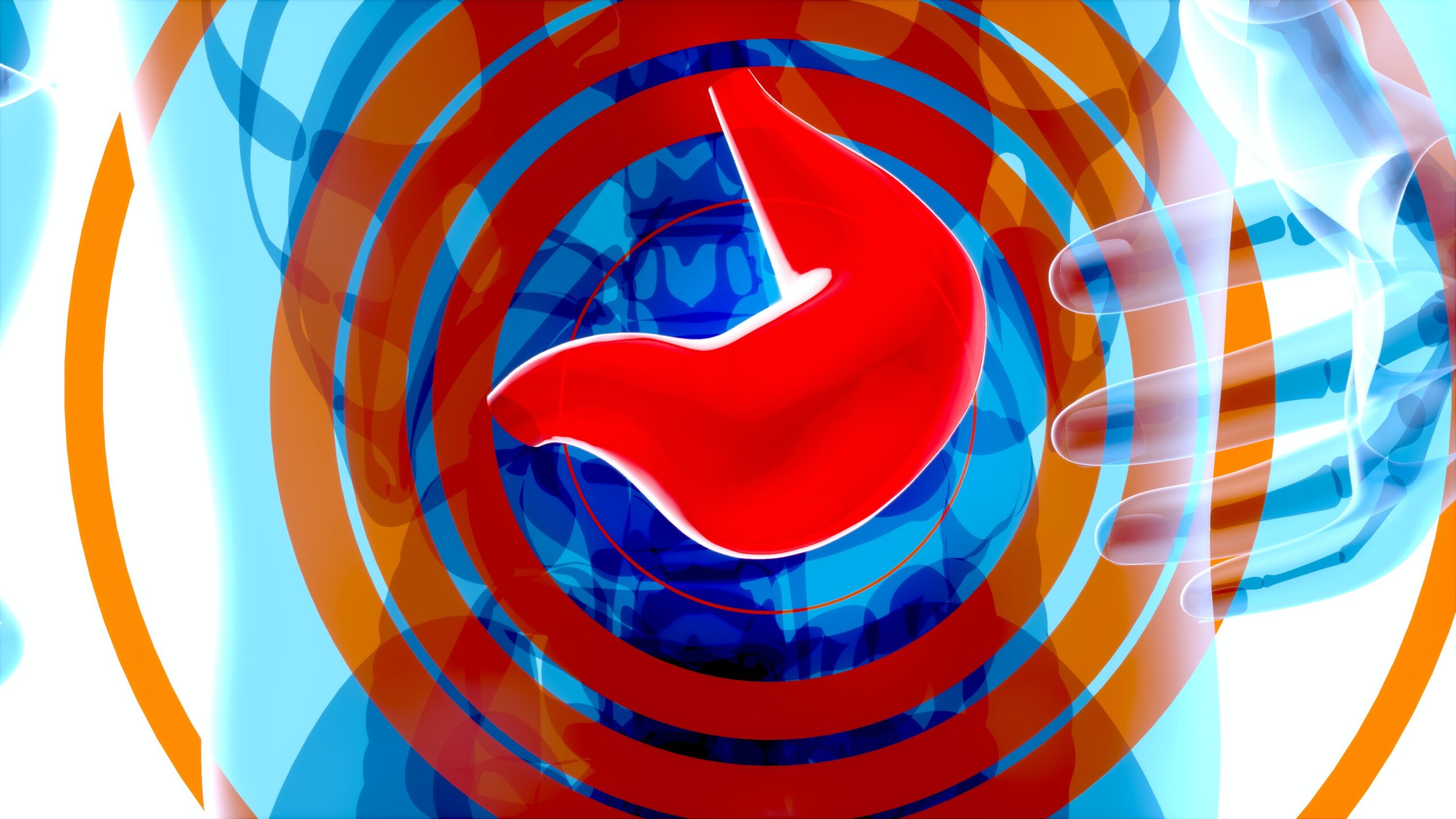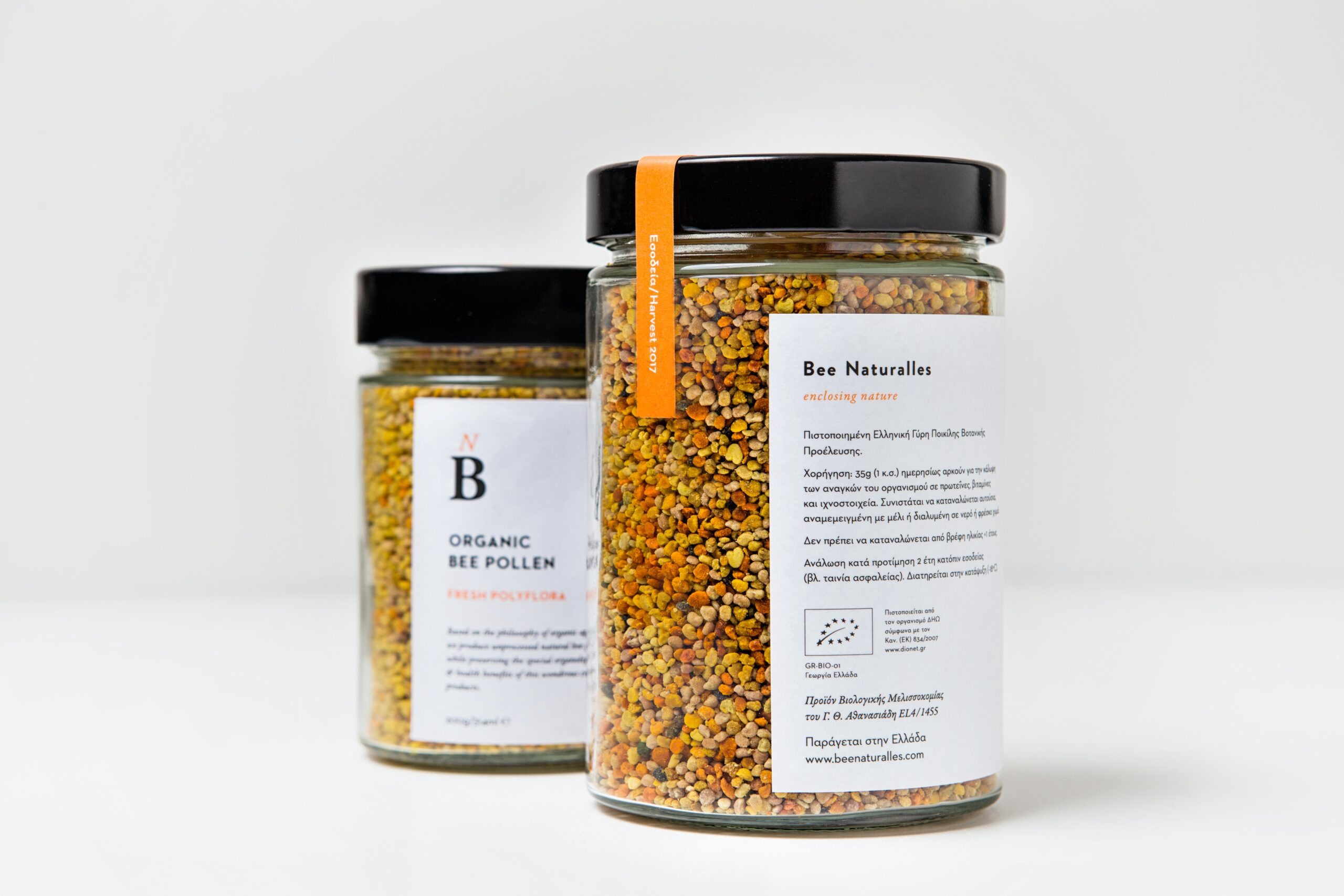Bee pollen is a superfood containing approximately 250 substances, such as lipids, amino acids, vitamins, micro- and macro-nutrients, and flavonoids. For some people, bee pollen is an apitherapeutic product because it contains substances used in alternative medicine: honey and flower pollen. In addition, it has antioxidant and anti-inflammatory properties, what is valued in apitherapy.
However, concerning conventional medicine, bee pollen is considered a dietary supplement and should only be incorporated into a diet with a healthcare professional's expertise. As a dietary supplement, it is not intended to prevent health conditions or treat diseases. Consult a dietician, pharmacist, or general practitioner before buying and testing bee pollen products.
Bee pollen is a mixture of several ingredients stored in the hive by bees. It consists of the following components:
Bee pollen products you can buy in stores are little yellow or dark brown granules. They have a sweet taste and floral tones, which depend on what plant the pollen has been harvested from by bees.
The first step in producing bee pollen occurs when bees collect pollen from the plant anthers. It is then transported to the hive, mixed with the bee's secretion or nectar, and placed in the honeycomb cells. Finally, the mixture is covered with ‘bee bread,' a layer of wax and honey that provides essential nutrition (fats, proteins, and minerals) for the colony.
Bee pollen is collected from the hives thanks to pollen traps![]() . They allow beekeepers to gather the mixture when bees enter and exit the hive. Most of the product is sold to companies making supplements and other bee pollen-based products such as soaps and cosmetics. Some amounts of unprocessed bee pollen can be acquired from beekeepers who sell it locally.
. They allow beekeepers to gather the mixture when bees enter and exit the hive. Most of the product is sold to companies making supplements and other bee pollen-based products such as soaps and cosmetics. Some amounts of unprocessed bee pollen can be acquired from beekeepers who sell it locally.
One bee colony is estimated to provide one to seven kilograms of bee pollen per year, which amounts to 50 to 250 grams a day.
Bee pollen granules have an impressive nutritional profile. They contain amino acids, lipids, vitamins, and about 250 bioactive substances. Most nutrients a human body needs are present in bee pollen, which makes it often considered a superfood, alternative medicine, and even a conventional medicine by certain institutes such as the German Federal Board of Health.
The nutritional profile![]() of bee pollen is explained below:
of bee pollen is explained below:
| Water-soluble vitamins | Vitamin B1, Vitamin B2, Vitamin B6, Vitamin C |
| Fat-soluble vitamins | Vitamin A, Vitamin D, Vitamin E |
| Acids | biotin, rutin, pantothenic, nicotinic, inositol, folic |
| Macro-elements | sodium, magnesium, calcium, phosphorus, potassium |
| Micro-elements | zinc, copper, manganese, iron, selenium |
Consuming bee pollen is linked to several health benefits![]() due to its antioxidant, anti-inflammatory, and anti-microbial properties. The presence of 250 bioactive compounds plays a significant role in assisting the body in numerous processes. Here are some of the most promising benefits that have been confirmed by science:
due to its antioxidant, anti-inflammatory, and anti-microbial properties. The presence of 250 bioactive compounds plays a significant role in assisting the body in numerous processes. Here are some of the most promising benefits that have been confirmed by science:
Bee pollen contains several antioxidant compounds. The most biologically active are carotenoids, polyphenols, flavonoids, quercetin, glutathione, and kaempferol. The high antioxidant activity![]() of bee pollen has been confirmed in the study conducted in 2005. Researchers found that it shares similarities with fermented food such as cheese, vinegar, natto, and miso which possess remarkable antioxidant qualities, significantly reducing the effects of oxidative stress in the body.
of bee pollen has been confirmed in the study conducted in 2005. Researchers found that it shares similarities with fermented food such as cheese, vinegar, natto, and miso which possess remarkable antioxidant qualities, significantly reducing the effects of oxidative stress in the body.
Consuming foods containing the above substances can benefit you in a number of ways. For instance, they protect the body from chronic diseases such as type 2 diabetes, cancer and slow aging by fighting unstable atoms (free radicals).
Researchers believe that these properties of bee pollen depend on the plant source – some flower pollen have higher antioxidant content than others.
Reducing inflammation is another perk of consuming bee pollen. It has been compared to various drugs used to ease the symptoms of inflammation. One animal study published in Pharmaceutical Biology found that honeybee pollen![]() vastly increases antioxidant activity in mice with acetaminophen-induced liver necrosis.
vastly increases antioxidant activity in mice with acetaminophen-induced liver necrosis.
Bee pollen is packed with water-soluble and fat-soluble vitamins and minerals, contributing to glowing and healthy skin. Because they stimulate the blood supply to skin cells and detoxify the body, they make skin appear younger and reduce the number of wrinkles.
Improved blood circulation in the skin also leads to additional benefits, such as preventing platelet aggregation and relieving pain. What is more, reducing microbial activity on the skin prevents infections, allowing burns or wounds to heal more quickly.
Kaempferol![]() , a polyphenol compound present in bee pollen, may be responsible for inhibiting inflammatory reactions of burns and wounds. According to research, it can also prevent swellings.
, a polyphenol compound present in bee pollen, may be responsible for inhibiting inflammatory reactions of burns and wounds. According to research, it can also prevent swellings.
Nerve cells also benefit from improved blood supply thanks to the properties of bee pollen. A stronger nervous system and better mental capacity are among the benefits of better blood circulation in the nerve tissue.
It has been confirmed that small doses of bee pollen consumed over a long period may boost energy, decrease stress levels, and improve overall mood.
The liver's main task is to remove toxins![]() from the body. Researchers have found that bee pollen may aid this organ in its detoxifying job. For instance, the animal study published in Evidence-Based Complementary and Alternative Medicine suggests that chestnut bee pollen assists the body in healing the liver that suffered damage from toxic substances it is disposing of.
from the body. Researchers have found that bee pollen may aid this organ in its detoxifying job. For instance, the animal study published in Evidence-Based Complementary and Alternative Medicine suggests that chestnut bee pollen assists the body in healing the liver that suffered damage from toxic substances it is disposing of.
Other studies conducted on animals yielded similar results: antioxidants present in bee pollen protect the liver from toxic substances, helping it regenerate.
However, there were few studies conducted on humans in this regard. More research is needed to confirm whether bee pollen's anti-inflammatory effects continue beyond animals.

There are no official recommended daily intakes of bee pollen issued by science boards or institutions. More high-quality studies are needed to establish the best amounts depending on age, sex, and other factors. At the moment, make sure to take no more bee pollen product than is written on the label. You can also consult a dietician to ensure that the amount you take best suits your needs.
Taking massive doses of bee pollen may cause toxicity and result in liver problems. This side effect is not guaranteed to occur – it is believed that only the pollen from certain plants, and only if taken in excessive amounts, can damage your liver.
There is a variety of bee pollen products to choose from. Granules are the most popular form, but you can also buy protein bars, powders, and pills. They are increasingly popular, so finding them in most health food stores is relatively easy.
You may initially be confused by bee pollen granules, but eating them is easier than you think. All you need to do is add granules to any food you like. As long as you follow the directions on the label, you can safely prepare a meal or a snack with bee pollen granules. Salads, cereals, yogurts, and baked goods with granules are several ideas you can try.
Add them to a glass of milk or water or mix them with honey or a smoothie. If you like, it is also possible to eat them raw. No matter what option is your favorite, food with an addition of bee pollen will boost your immune system and detox your body.

Storage instructions may vary depending on the brand and type of bee pollen product, so read the directions on the packaging's label carefully. Most of the time, it is recommended to keep them in a dry place at room temperature. Enclosed spaces such as cabinets or closets are the best options, as they will keep bee pollen away from light.
Bee pollen is safe for most people, even in its raw, unprocessed form. Some people may need to avoid it due to allergic reactions. Pregnancy and allergy to pollen or bees are risk factors that may cause side effects after taking bee pollen products.
If you are allergic to bees or pollen, you can experience the following symptoms![]() after consuming bee pollen:
after consuming bee pollen:
Bee pollen is also considered unsafe for pregnant women because it may stimulate the uterus and, as a result, threaten the pregnancy. As for breastfeeding, there isn't enough data to confirm whether it is harmful during that period. If you are wondering if you can incorporate bee pollen into your diet during pregnancy or breastfeeding, consult your health provider to receive professional guidance.
Another possible harmful interaction is consuming bee pollen supplements while taking medications that prevent or reduce blood clotting. Bee pollen may change how these medications affect your body, increasing their effect. It may result cause you getting bruised and bleeding more easily.
Bee pollen has an impressive nutritional profile and many health benefits, deserving its superfood status. It contains proteins, vitamins, fatty acids, polyphenols, and micro- and macro-nutrients. Because of its strong anti-microbial, anti-inflammatory, and antioxidant properties, it aids the body in numerous processes, strengthening its response to free radicals and diseases.
You can use bee pollen products in plenty of ways. Granules can be added to smoothies, cereals, salads, yogurts, or just a glass of water. You can also try out tasty bee pollen snacks such as granule bars or make your own baked treat.